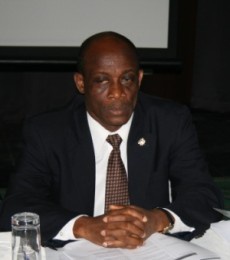Government has proposed to set up the Ghana Infrastructure Fund (GIF) to deal with the huge infrastructure deficit and to focus on strategic infrastructure that will lead to job creation and the growth of the economy.
“The GIF is a response to the need to manage Ghana‘s limited but potentially expanding fiscal space; sub-optimal classification and management of public debt; and difficulties in mobilising funds, in particular for infrastructure projects of a commercial nature,” Mr. Seth Terkper, the Minister of Finance and Economic Planning, said yesterday when he presented the 2014 budget to Parliament in Accra.
In a quick response, the Director General of the Securities and Exchange Commission (SEC), Mr. Adu Anane Antwi, who has been pushing for the establishment of such a fund to address the infrastructure gap, welcomed the proposal to create the GIF.
“This is a good proposal. There is a need to have such large funds for our infrastructure development since government borrowing alone cannot do that -- because we will end up borrowing to the excessive limit which would not be sustainable,” he said.
“We believe that government will invite international financial institutions to team up in partnership, probably in the form of equity, so that the company can be owned by government and these financial institutions, and be able come to the market and raise bonds for the development of infrastructure in the country.”
The GIF will be a quasi-fiscal body chaired by the Minister of Finance, and will pursue its own ratings on the domestic and international financial and capital markets.
“The linkages to the private sector are crucial, since to leverage private sector investment in infrastructure projects, it is necessary to vigorously pursue long-term quasi-fiscal institutions as well as banking and capital market solutions,” Mr. Terkper said.
Conservative estimates by the government indicate that the country’s huge infrastructure deficit requires sustained spending of at least US$1.5billion per annum over the next 10 years to address the shortfall.
The deficit covers all the main infrastructure areas: roads, energy, water, aviation, housing, and ICT. In the housing sector, for instance, the government estimates that the country needs to build about a million more units to bridge the demand-supply gap.
The intention of government, the Finance Minister said, is to consolidate the use of commercial financing facilities to finance projects that can repay commercial loans that the government contracts directly or guarantees.
It is also a means of freeing grants and concessional facilities for social infrastructure projects that often return benefits indirectly through improvements in social indices.
The successful implementation of the GIF will therefore provide several opportunities to apply national resources in various novel ways, including long-term infrastructure bonds to accelerate the upgrading and renewal of critical national infrastructure.
The major sources of funds for the proposed fund will include the recent 2.5 percent increase in the Value Added Tax (VAT) and the portion of petroleum receipts used for debt amortisation and infrastructure development.
Government estimates the benchmark revenue from petroleum receipts for the year 2014 at US$584.39 million (GH¢1,285.66 million). Of this amount, US$409.07 million (GH¢899.96 million), representing 70 percent, will be spent on the budget.
“In the medium term, government has decided to spend the ABFA (Annual Budget Funding Amount) on the development of six major specific projects and to clear the pipeline of infrastructure projects,” the Minister said.
The GIF, with the assistance of the Bank of Ghana, will set up and manage a Debt Service Account (DSA) to service designated domestic and foreign sovereign debts.
The account will utilise the flows of foreign exchange from oil to spur confidence in the markets and minimise foreign exchange exposures.
The board of the GIF will advise the Minister on viable projects, including those involving special purpose vehicles (SPVs) such as joint ventures and public-private partnership (PPP) projects.
It is envisaged that the fund will issue special bonds to finance specific commercial projects. It will be empowered to set up on-lending, escrow and other mechanisms for the purposes of pursuing and ensuring the success of its investments.
Mr. Seth Terpker said the establishment of the fund will lead to a review of government‘s exposure to risks from borrowing and issuing sovereign guarantees.
“It is our intention to minimise the use of sovereign guarantees that are currently treated automatically as public debt in our Debt Sustainability Analysis (DSA) band, and not as contingent liabilities. We are currently in discussions with the World Bank and African Development Bank (AfDB) on the appropriate classification of SOE and other guarantees. Where guarantees are essential, we will maximise the use of third-party guarantees such as MIGA guarantees and World Bank/AfDB partial and credit risk guarantees.”
Business News of Wednesday, 20 November 2013
Source: B&FT
Gov’t to establish infrastructure fund to bridge deficit

















